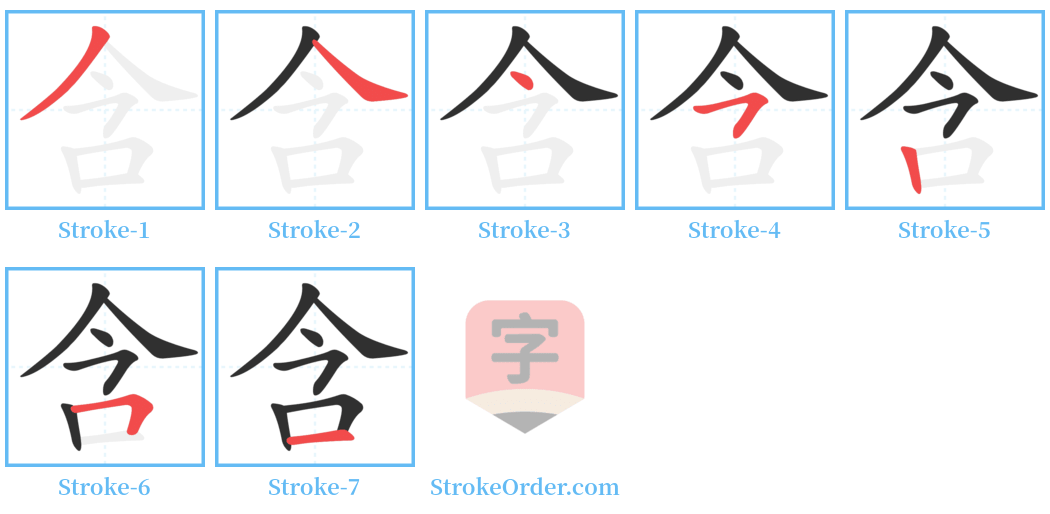含 Stroke Order
Animated Stroke Order of 含

Stroke Order Diagrams for 含

Step-by-Step Handwriting Guide for 含

Learn to Write Chinese Characters with Video Tutorials
Watch the video of writing the Chinese character "含", learn the correct stroke order (笔顺) of the character "含", and master the standard way of writing the character "含".
Free Printable Handwriting Practice with Stroke Order: 含
Printable Writing Practice Worksheet of "含" in Portrait Orientation (Tian Zi Ge)

Printable Writing Practice Worksheet of "含" in Landscape Orientation (Tian Zi Ge)

Information of 含
Pinyin
hán
Radical
口
Strokes
7 strokes
Usage
★★★★★
Definition
to keep / to contain
含
[hán]
动
1. Keep in the mouth: 衔在嘴里,不吐出也不咽下。
- Example: 含一口水。 [Keep a mouthful of water.]
- Example: 含漱剂。 [Keep a mouthful of mouthwash.]
- Example: 含英咀华。 [Repeatedly savoring the subtleties of literature.]
- Example: 含饴弄孙。 [Holding candy to tease the grandchildren, describing the joys of old age.]
2. Contain: 藏在里面,包容在里面。
- Example: 包含。 [To include.]
- Example: 含义。 [The meaning contained.]
- Example: 含量。 [Content amount.]
- Example: 含苞。 [Bud stage.]
- Example: 含蕴。 [Contain profound meaning.]
- Example: 含混。 [Mix together.]
- Example: 含垢纳污。 [To tolerate bad people and bad deeds.]
3. Cherish or nurse emotions: 怀有某种感情或意思,不完全表露出来。
- Example: 含怒。 [Harboring anger.]
- Example: 含羞。 [Feeling shy.]
- Example: 含情。 [Harboring emotions.]
4. 【引】
- "《说文》:含,嗛也。" [In "Shuowen," it states: to keep in the mouth.]
- "《释名·释饮食》:含,口也,合口亭之也。" [In "Shiming" it states: It relates to the mouth, closing the lips around something.]
- "《庄子·马蹄》:含哺而熙,鼓腹而游。" [In "Zhuangzi," it describes: Holding food in the mouth, contentedly swimming.]
- "《庄子·外物》:生不布施,死何含珠为?" [In "Zhuangzi," it questions: If one does not give while alive, what gain is there in holding pearls in death?]
- "《后汉书·明德马皇后传》:吾但当含饴弄孙。" [In "Book of the Later Han," it states: I should just take pleasure in candy and playing with my grandchildren.]
含
[hàn]
名
Gems or pearls formerly put into the mouth of a corpse: 古时丧葬时放在死人口里的珠玉。
Used by the emperor: 天子用玉,诸侯用璧,士用米贝。
【引】
1. "王使荣叔归含且赗。" [The king instructed Rong Shuh to return with gems for burial.]
2. "《周礼·天官·玉府》:大丧共(供)含玉。" [In "Zhouli," it states: In a major funeral, provide jade.]
3. "《公羊传·文公五年》:含者何,口实也。" [In "Gongyang," it discusses: What is '含'? It is the substance in the mouth.]
4. "《谷梁传·隐公元年》:贝玉曰含。" [In "Guliang," pearls and jade are referred to as '含.']
5. "《战国策·赵策三》:死则不得饭含。" [In "Zhan Guo Ce," it states: In death, one cannot have food '含.']
to contain / to hold / (of a person or style etc) reserved / restrained / (of words, writings) full of hidden meaning / implicit / veiled (criticism)
Input Method for 含
Pinyin
han2
Wubi
wynk
Cangjie
oinr
Zhengma
odxj
Four Corner
80602
Unicode
U+542b
Same Pronunciation Characters